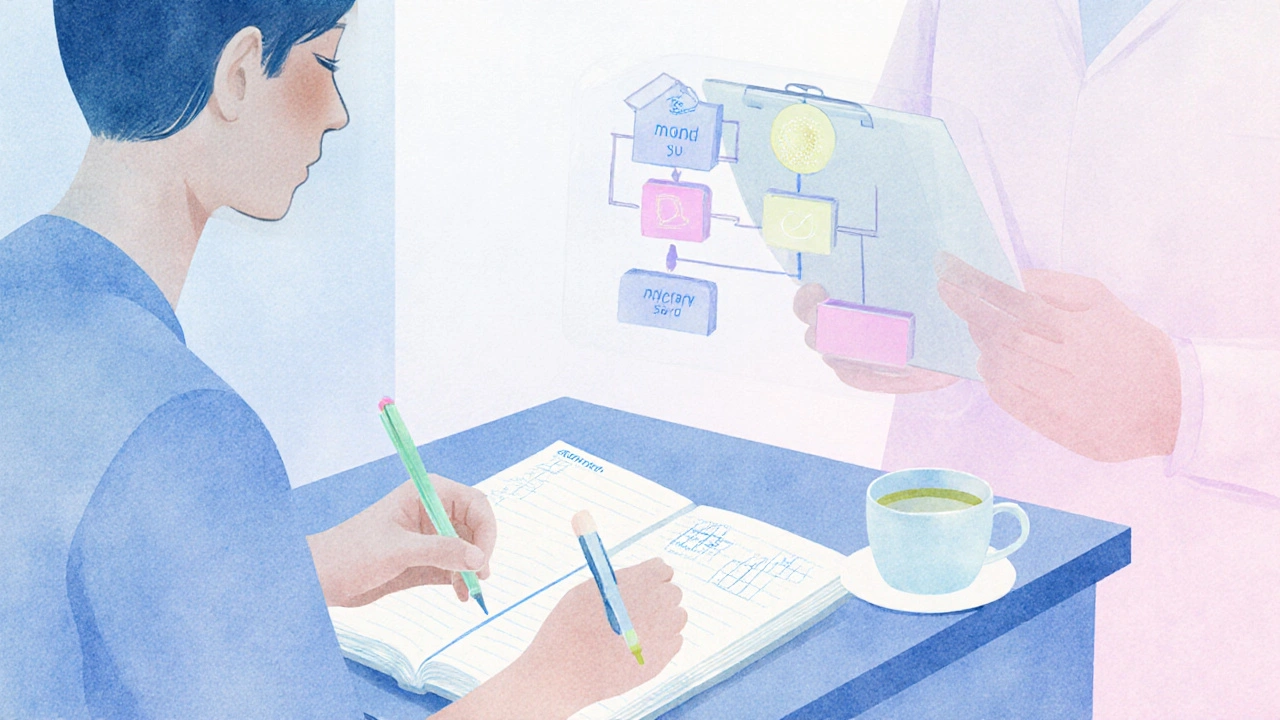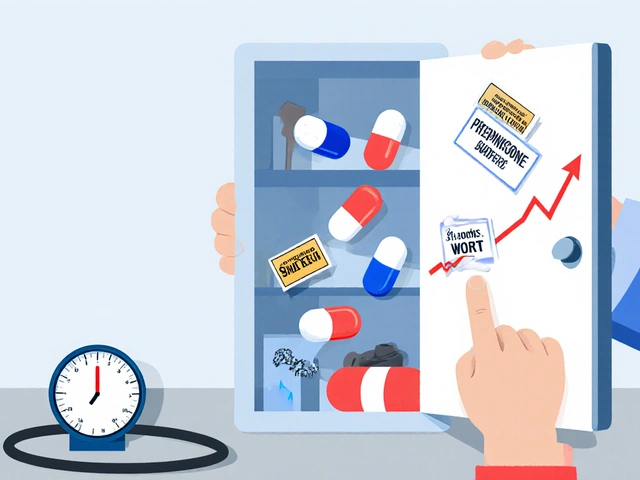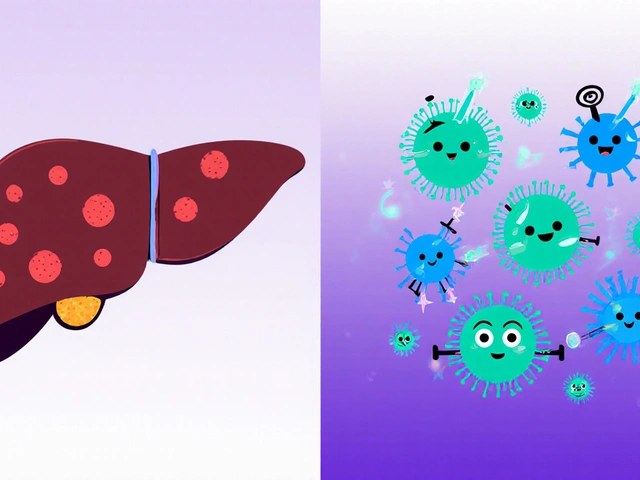
Antidepressant Comparison Tool
| Medication | Class | Typical Side Effects | Cost (Monthly) | Special Notes |
|---|---|---|---|---|
| Celexa (Citalopram) | SSRI | Nausea, dry mouth, mild insomnia | $10-$20 | Good for mild-moderate depression |
| Escitalopram | SSRI | Headache, fatigue, increased sweating | $12-$22 | Often faster relief, higher remission rates |
| Sertraline | SSRI | Diarrhea, sexual dysfunction, tremor | $8-$18 | Best for anxiety-dominant cases |
| Fluoxetine | SSRI | Insomnia, agitation, weight loss | $9-$19 | Long half-life, good for missed doses |
| Venlafaxine | SNRI | Elevated blood pressure, nausea | $15-$30 | Effective for chronic pain and high-energy anxiety |
| Bupropion | Atypical | Dry mouth, insomnia, tremor | $12-$25 | Good alternative to avoid sexual side effects |
Celexa is one of the most prescribed antidepressants, but it isn’t the only option. Below you’ll find a side‑by‑side look at Celexa and the most common alternatives, so you can decide which drug fits your needs.
- Celexa (citalopram) is an SSRI with a good safety record for mild‑to‑moderate depression.
- Escitalopram often provides faster relief with a similar side‑effect profile.
- Sertraline may be better for anxiety‑dominant cases.
- Fluoxetine’s long half‑life makes it useful for patients who miss doses.
- Venlafaxine (SNRI) and bupropion (atypical) are good when SSRIs cause unwanted sexual side effects.
What Is Celexa (Citalopram)?
Celexa is the brand name for citalopram, a selective serotonin reuptake inhibitor (SSRI) approved for major depressive disorder and, in some regions, anxiety. It was first FDA‑approved in 1998 and quickly became popular because of its once‑daily dosing and relatively low cost in generic form.
How Celexa Works
Citalopram blocks the reabsorption (reuptake) of serotonin in the brain, keeping more of the neurotransmitter available to improve mood. This mechanism is shared by other SSRIs, but citalopram’s molecular structure gives it a slightly higher affinity for the serotonin transporter, which can translate to a milder side‑effect profile for many users.
Key Factors to Consider When Choosing an Antidepressant
Before diving into alternatives, keep these five criteria in mind:
- Efficacy: How quickly does the drug lift mood in clinical trials?
- Side‑effects: Which adverse reactions are most common and how severe are they?
- Drug interactions: Does it play well with other meds you’re taking?
- Cost & insurance coverage: Is the generic version affordable?
- Special considerations: Pregnancy safety, age‑related dosing, or co‑existing conditions.
Top SSRI Alternatives
Below are the most widely used SSRIs that often replace Celexa.
Escitalopram (brand name Lexapro) is the S‑enantiomer of citalopram, meaning it’s a more “pure” version of the same molecule. Clinical data show a 10‑15% higher remission rate compared with citalopram, especially in patients with severe depression.
Sertraline (Zoloft) is another SSRI that blocks serotonin reuptake but also has a modest effect on dopamine. This makes it a popular choice for patients who experience anxiety, obsessive‑compulsive disorder, or panic attacks alongside depression.
Fluoxetine (Prozac) is known for its long half‑life (about 4‑6 days), which reduces withdrawal symptoms if a dose is missed. It’s also approved for binge‑eating disorder and premenstrual dysphoric disorder, giving it a broader therapeutic reach.
Non‑SSRI Alternatives Worth Looking At
When SSRIs cause unwanted sexual dysfunction or weight gain, doctors often turn to agents from different classes.
Venlafaxine (Effexor) belongs to the serotonin‑norepinephrine reuptake inhibitor (SNRI) group. It tackles both serotonin and norepinephrine, which can be helpful for patients with high‑energy anxiety or chronic pain alongside depression.
Bupropion (Wellbutrin) works by inhibiting the reuptake of dopamine and norepinephrine. It’s the go‑to option for smokers who want to quit and for people who want to avoid SSRI‑related sexual side effects.
Side‑Effect Snapshot
All antidepressants carry risks, but the pattern of side effects differs enough to matter.
| Medication | Typical Side‑Effects | Serious Risks | Cost (USD, generic monthly) |
|---|---|---|---|
| Celexa (citalopram) | Nausea, dry mouth, mild insomnia | QT‑interval prolongation at >40mg/day | $10‑$20 |
| Escitalopram | Headache, fatigue, increased sweating | Rare serotonin syndrome | $12‑$22 |
| Sertraline | Diarrhea, sexual dysfunction, tremor | Bleeding risk with NSAIDs | $8‑$18 |
| Fluoxetine | Insomnia, agitation, weight loss | Activation of mania in bipolar | $9‑$19 |
| Venlafaxine | Elevated blood pressure, nausea | Hypertension at high doses | $15‑$30 |
| Bupropion | Dry mouth, insomnia, tremor | Seizure risk at >450mg/day | $12‑$25 |

How to Choose the Best Fit for You
Use this simple decision tree:
- If you need a low‑cost, once‑daily SSRI with minimal drug interactions, start with Celexa (citalopram).
- If you notice sexual side effects or the dose needs to stay under 20mg because of QT concerns, try Escitalopram or Bupropion.
- When anxiety is a dominant symptom, Sertraline often outperforms pure SSRIs.
- For patients who frequently miss doses, Fluoxetine’s long half‑life provides a safety net.
- If chronic pain or high‑energy anxiety co‑exists with depression, consider an SNRI like Venlafaxine.
Always discuss these options with a prescriber, especially if you’re on other medications (e.g., blood thinners, migraine treatments) or have underlying heart conditions.
Practical Tips for Switching Antidepressants
- Never stop a medication abruptly; taper over 1‑2 weeks unless directed otherwise.
- When moving from one SSRI to another, a 1‑week washout is usually enough, but drugs with longer half‑lives (like fluoxetine) may require a longer gap.
- Track your mood daily for at least two weeks after a switch-this helps your doctor adjust the dose quickly.
- Watch for overlapping side effects during the transition period; mild nausea or headache is common and typically fades.
Frequently Asked Questions
Can I take Celexa with alcohol?
Occasional light drinking isn’t strictly forbidden, but alcohol can worsen side effects like drowsiness and increase the risk of serotonin syndrome. It’s safest to limit intake and talk to your doctor.
How long does it take for Celexa to work?
Most people notice a subtle improvement after 2‑3 weeks, but the full therapeutic effect can take 6‑8 weeks. Patience and regular follow‑ups are key.
Is Celexa safe for pregnancy?
Citalopram is classified as category C in many regions, meaning risk cannot be ruled out. Doctors usually weigh the benefits against potential fetal exposure and may switch to a different SSRI if needed.
Why does my doctor monitor my heart rate when I’m on Celexa?
High doses (>40mg/day) have been linked to QT‑interval prolongation, a heart rhythm issue. Regular ECGs ensure the medication stays within a safe range.
What should I do if I miss a dose?
Take the missed dose as soon as you remember unless it’s almost time for the next one. In that case, skip the missed pill and continue with your regular schedule-don’t double‑dose.
Choosing the right antidepressant is a personal journey. By weighing efficacy, side‑effects, cost, and special health factors, you can land on a medication that truly supports your mental well‑being.
15 Comments
Abhinanda Mallick
October 7, 2025 AT 03:16 AM
From an Indian perspective, the global market’s obsession with brand names often overshadows local generic production that could lower costs dramatically.
The pharmacoeconomic data suggests that Celexa’s low price is a boon for emerging economies, yet the same data also reveals hidden cardiac risks that cannot be ignored.
Escitalopram, while marginally more expensive, delivers faster remission, a fact that aligns with our national drive for rapid therapeutic outcomes.
Sertraline’s anxiolytic profile is particularly valuable for patients with comorbid anxiety, a common presentation in our psychiatric clinics.
Ultimately, the choice must balance fiscal prudence with clinical efficacy, a balance that our healthcare policy strives to achieve.
Richard Wieland
October 7, 2025 AT 17:09 PM
Celexa remains a viable first‑line SSRI for many patients.
Its cost effectiveness is undeniable, especially for those on a budget.
However, the risk of QT prolongation above 40 mg must be monitored.
Switching to escitalopram can provide a modest remission boost.
Sertraline excels when anxiety dominates the clinical picture.
Fluoxetine’s long half‑life offers a safety net for missed doses.
Venlafaxine’s dual action helps when chronic pain co‑exists with depression.
Bupropion is the go‑to for avoiding sexual side effects.
When evaluating alternatives, consider drug–drug interactions thoroughly.
Patients with cardiovascular concerns should prioritize ECG monitoring.
Insurance coverage often dictates the final choice for many families.
Generic availability has improved access across the board.
Adherence rates improve when side‑effects are minimal.
Regular mood tracking guides dose adjustments effectively.
Always discuss any change with a qualified prescriber.
rachel mamuad
October 8, 2025 AT 07:02 AM
Hey folks, diving into the pharmaco‑kinetics matrix, Celexa’s CYP2C19 metabolism curve is kinda “meh” compared to the escitalopram enantiomeric purity which spikes the bioavailability index.
But watch out for QT‑prolongation, that’s a red flag in the electrophysiology domain.
If you’re chasing a lower NNT, sertraline’s serotonergic‑dopaminergic cross‑talk might be your sweet spot.
Don’t forget the cost‑utility analysis – generic citalopram still dominates the price‑performance quadrant.
TL;DR: weigh the PK/PD trade‑offs before you commit.
Amanda Anderson
October 8, 2025 AT 20:56 PM
I remember the first time I was prescribed Celexa – the hope was like a sunrise, but the side effects felt like a storm rolling in.
Every morning the nausea hit hard, and the dry mouth made it hard to even enjoy coffee.
When I switched to sertraline, the anxiety lifted and the world seemed brighter.
It felt like stepping out of a fog into sunlight.
That’s why I think personal experience matters more than a spreadsheet.
Carys Jones
October 9, 2025 AT 10:49 AM
Cost should never trump safety when the heart is on the line.
Roxanne Porter
October 10, 2025 AT 00:42 AM
I appreciate the comprehensive comparison presented here; it offers a solid framework for clinicians to individualize treatment plans.
When discussing options with patients, emphasizing both efficacy and potential adverse effects fosters shared decision‑making.
Moreover, integrating cost considerations respects the socioeconomic realities many face.
Overall, this tool enhances therapeutic transparency.
Jonathan Mbulakey
October 10, 2025 AT 14:36 PM
Choosing an antidepressant mirrors the broader existential dilemma of seeking balance amidst competing priorities.
One must weigh the immediate relief against long‑term physiological implications.
The decision, therefore, becomes an act of self‑reflection as much as a medical choice.
Warren Neufeld
October 11, 2025 AT 04:29 AM
I’ve seen patients thrive on Celexa when cost is a major concern, yet others struggle with the subtle side effects.
It’s important to monitor each individual’s response and adjust promptly.
Open communication with the prescribing doctor can make all the difference.
Deborah Escobedo
October 11, 2025 AT 18:22 PM
Celexa works well for many but watch the dose limit to avoid heart issues. If you have anxiety try sertraline. For sexual side effects consider bupropion. Cost conscious? Celexa stays cheap. Always involve your doctor.
Dipankar Kumar Mitra
October 12, 2025 AT 08:16 AM
Listen, bro, the brain’s chemistry isn’t a joke. If Celexa leaves you feeling flat, you need something that hits harder – maybe escitalopram or even venlafaxine if pain’s in the mix. Don’t just sit there, talk to your doc and get the right fix. You deserve a mood boost that actually works, no more half‑measures.
Tracy Daniels
October 12, 2025 AT 22:09 PM
When guiding someone through antidepressant choices, start by reviewing their medical history, current medications, and personal priorities.
Explain the differences between SSRIs, SNRIs, and atypical agents in plain language.
Highlight that while Celexa is affordable, alternatives like escitalopram may offer faster remission for some patients.
Encourage patients to track side effects and mood changes diligently.
Remember, shared decision‑making leads to better adherence 🙂.
Hoyt Dawes
October 13, 2025 AT 12:02 PM
Honestly, this comparison feels like a reheated lecture nobody asked for.
The tables are neat, but the real world is messy, and patients don’t care about pretty rows.
Just pick a cheap SSRI and move on.
Jeff Ceo
October 14, 2025 AT 01:56 AM
While it’s fine to present data, pushing one drug as the “best” without context is aggressive and unhelpful.
Everyone’s situation is unique, so a balanced view is essential.
David Bui
October 14, 2025 AT 15:49 PM
Look, the whole thing reads like a generic pharma brochure. If you actually want to help people, stop sugar‑coating the risks and call out the QT issue with Celexa straight away.
People need raw facts, not fluff that makes them think every option is equal.
Also, the cost section ignores insurance rebates that can flip the script entirely.
Bottom line: be honest or be irrelevant.





Kayla Reeves
October 6, 2025 AT 13:22 PM
Choosing a cheap antidepressant just because of price ignores the ethical responsibility to prioritize patient health.